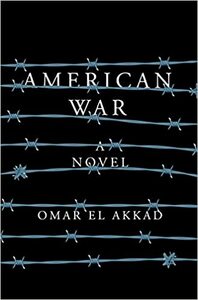Take a photo of a barcode or cover
This is a compelling novel which pivots around a second American Civil War in the year 2074 and one family's fortunes and misfortunes resulting from it. Our protagonist is Sarat Chestnut, a boyish and plucky twin whose portrayal in the narrative is so well written that it is very easy for a reader to relate to her. The book describes the divisiveness and cruelty of this second USA war, concentration camps, methods of torture (though not in great detail, but adequate for the novel), and the psychological after-effects that conflict and its repercussions can have on affected people. It is a very gripping read. Additionally, the author provides a twist in the narrative two-thirds of the way into the book, changing the viewpoint from one generation to another in a very subtle way.
Highly recommend, even if dystopian drama is not your usual genre. It's extremely readable, and is very hard to put down.
Highly recommend, even if dystopian drama is not your usual genre. It's extremely readable, and is very hard to put down.
Haunting, eloquent, and uncompromising, American War takes our current time of intensifying political and cultural polarization to its logical conclusion. With a realistically plausible premise and a depiction that is uncomfortably close to where we are today, American War is as thrilling to read as it is frightening.
I was forced to read this book by my honors college. I hated it then, but I realize now that feeling is completely undeserved. I will give it the fairest possible review I can given the hindsight I have now.
First, it isn’t a perfectly crafted book. It felt like a first draft, and could be a much more powerful read with strong edits. The types of changes I would recommend would be cutting down the 100-page slog of an introduction before the inciting event of the story, and making the sex scenes less gratuitous. I have no qualms with Akkad’s the portrayal of the characters’ developing sexualities in the story, as it is a true to life portrayal and cannot be faulted on those grounds, but at times they felt like the went on too long or were an unnecessary distraction from the action instead of the essential characterization they were meant to be. And by that I mean, please cut the scene where she washes shit off herself while they dude watches...that’s a meme and not in a good way. I will say its best features are the portions of government documents interspersed. Those were refreshingly accurate and made the world of the story seem like one not unlike our own, which as I will discuss, is the best part of the book.
With those criticisms aside, this book is a remarkably excellent allegory. It is a construction of a world totally foreign to Americans but a very prescient reality for non-Americans, one of struggle, famine, and suffering under the boot of a foreign empire. In this story, that is the Bouazizi empire, the Nasserist pan-Arabian dream realized by a very hopeful result of the Arab Spring. America is a fragmented, weak country with a Prohibition Era for oil resulting in a new Confederacy in what remains of the Deep South after climate change. It is these topics, salient in the story, that are essential facts in the world into which my generation was borne: drones, civil war, migrant life and aid, profound global inequity, torture and resulting extremism, drones, illicit activity done in the name of spycraft, and now disease on a mass scale. The more I learn about the sins of my country—Abu Ghraib, drone strikes of innocents, meddling in elections and wars, to name a few—the more I realize this book is less an original story and more a means of giving perspective to these crimes. More importantly is the unanswered question this book implicitly posits, “why must the cycle of violence continue?” Or to put it more boldly, “why is the cycle of violence allowed to continue?” This is the question of the main character’s life, one the book does not answer because it cannot answer it. That question is where the allegory ends. It is a question the real world too has failed to answer, a failure we vainly hope will be corrected one day.
Also, here’s a tip: get the audiobook. The narration is beautifully done and I enjoyed this book a lot more with the verbal narration compared to reading the text.
First, it isn’t a perfectly crafted book. It felt like a first draft, and could be a much more powerful read with strong edits. The types of changes I would recommend would be cutting down the 100-page slog of an introduction before the inciting event of the story, and making the sex scenes less gratuitous. I have no qualms with Akkad’s the portrayal of the characters’ developing sexualities in the story, as it is a true to life portrayal and cannot be faulted on those grounds, but at times they felt like the went on too long or were an unnecessary distraction from the action instead of the essential characterization they were meant to be. And by that I mean, please cut the scene where she washes shit off herself while they dude watches...that’s a meme and not in a good way. I will say its best features are the portions of government documents interspersed. Those were refreshingly accurate and made the world of the story seem like one not unlike our own, which as I will discuss, is the best part of the book.
With those criticisms aside, this book is a remarkably excellent allegory. It is a construction of a world totally foreign to Americans but a very prescient reality for non-Americans, one of struggle, famine, and suffering under the boot of a foreign empire. In this story, that is the Bouazizi empire, the Nasserist pan-Arabian dream realized by a very hopeful result of the Arab Spring. America is a fragmented, weak country with a Prohibition Era for oil resulting in a new Confederacy in what remains of the Deep South after climate change. It is these topics, salient in the story, that are essential facts in the world into which my generation was borne: drones, civil war, migrant life and aid, profound global inequity, torture and resulting extremism, drones, illicit activity done in the name of spycraft, and now disease on a mass scale. The more I learn about the sins of my country—Abu Ghraib, drone strikes of innocents, meddling in elections and wars, to name a few—the more I realize this book is less an original story and more a means of giving perspective to these crimes. More importantly is the unanswered question this book implicitly posits, “why must the cycle of violence continue?” Or to put it more boldly, “why is the cycle of violence allowed to continue?” This is the question of the main character’s life, one the book does not answer because it cannot answer it. That question is where the allegory ends. It is a question the real world too has failed to answer, a failure we vainly hope will be corrected one day.
Also, here’s a tip: get the audiobook. The narration is beautifully done and I enjoyed this book a lot more with the verbal narration compared to reading the text.
adventurous
dark
inspiring
medium-paced
Plot or Character Driven:
A mix
I'm...still processing this one. Sci-fi (or cli-fi) but extra real. No heroes, no politics (or race?), no real hope, but home.
dark
tense
slow-paced
Plot or Character Driven:
A mix
Strong character development:
Yes
Loveable characters:
Complicated
Diverse cast of characters:
Yes
Flaws of characters a main focus:
Yes
Wow - I honestly didn't think I would enjoy this book as much as I did. The story mainly follows the perspective of Sarat, a girl who's life has been seriously altered many times because of the Second American Civil War. At first I found the book a little confusing with all the factors of the war and different rebellions, but after the first 50ish pages, everything kind of clicked.
This is a really good story about the effects of war and that no scenario is ever black or white.
Would definitely recommend.
This is a really good story about the effects of war and that no scenario is ever black or white.
Would definitely recommend.
Enjoyed this one a lot, and I had the opportunity to hear the author discuss his reasons for writing the book when he was in town a couple of months ago. Though I would have liked a bit more explanation about the underlying causes of the war and about how the global political landscape got to be the way it was, I understand that these were secondary characteristics to the book. The main point of the book, according to El Akkad (or according to what I understood from his discussion), was to address the universality of suffering in war, and he wanted to do this by transplanting examples of what has been happening in the Middle East into the United States. His goal was to show that indoctrination into violent fundamentalism and the resulting actions (suicide bombers, torture camps, etc.) were not isolated to particular cultures or regions, but that citizens of the United States could (and sometimes already do) fall into the same traps if the conditions were right. Given that, I think he portrayed the radicalization of Sarat and its consequences in a pretty believable way, that it was a slow build brought on by repeated personal tragedies and the work of slick-talking, practiced opportunists .
(4.5) This is a cautionary tale that is all the more effective because I felt like it was entirely believable. I loved this book -- it completely pulled me in and, days later, I'm still thinking about it. Highly recommended.
"'We forget, sometimes,' Gaines said, 'that there are still beautiful things.'"
"Sarat thought about how easy it would be to fix the mistake, to simply redraw the stars properly. But she knew that even broken history is history. The stars, cast wrong, must remain that way. It would be more wrong to change them."
"I sided with the Red because when a Southerner tells you what they're fighting for -- be it tradition, pride, or just mule-headed stubbornness -- you can agree or disagree, but you can't call it a lie."
"'We forget, sometimes,' Gaines said, 'that there are still beautiful things.'"
"Sarat thought about how easy it would be to fix the mistake, to simply redraw the stars properly. But she knew that even broken history is history. The stars, cast wrong, must remain that way. It would be more wrong to change them."
"I sided with the Red because when a Southerner tells you what they're fighting for -- be it tradition, pride, or just mule-headed stubbornness -- you can agree or disagree, but you can't call it a lie."
dark
slow-paced






